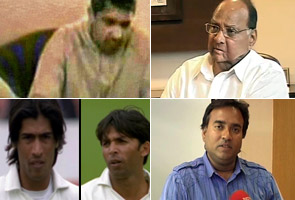After the scandal of spot-fixing rocked the cricketing world, the International Cricket Council (ICC) is now pushing for new ways to curb the menace. The ICC is believed to have approached the Indian government with a special request.
Cricket's topmost body is lobbying with the Centre to legalise betting. In India, the only betting that is allowed in sports is on horse racing.
The ICC's latest endeavour stems from a string of match-fixing allegations in the past involving Indian bookies.
Australians Mark Waugh and Shane Warne said they were given money by Indian bookies to pass on weather information in 1993.
Former South African captain Hansie Cronje said that he was introduced to an Indian bookie by former Indian skipper Mohd Azharuddin.
More recently, Mazhar Majeed, the man charged with paying Pakistani players for spot-fixing says he was acting on the behest of an Indian.
So, the Indian connection has been present in spot-fixing and most match-fixing scandals.
"It is far easier to manage the issue and the temptation of corruption if the betting industry was regulated and legalised...Where it is not regulated, where it is illegal, it tends to go underground and it becomes that much more difficult to manage the issue", Haroon Lorgat, CEO, ICC said.
The Pakistani trio of Salman Butt, Mohammed Asif and Mohammed Amir were caught courtesy the News of the World sting but bookmakers in England say that regulated bets allow them to catch on to suspicious trends very quickly.
Rupert Adams, Public Relations Executive, William Hill said, "Everything is scrutinised. As a risk operator, e.g. if we see a bit more money, even 1.5 per cent more in a market than we expect, all the screens go red and we immediately try to work out why that is."
According to guesstimates, every India-Pakistan game involves Rs. 90-100 crore of bets being placed.
IPL 3, meanwhile, had touched a new high with reports claiming that Rs. 1800 crore was bet on the tournament.
The government stands to earn huge revenue from legalised betting but the issue of morality has always hindered the change. Not surprisingly, lotteries too are allowed in just a few states in the country.
Cricket's topmost body is lobbying with the Centre to legalise betting. In India, the only betting that is allowed in sports is on horse racing.
The ICC's latest endeavour stems from a string of match-fixing allegations in the past involving Indian bookies.
Australians Mark Waugh and Shane Warne said they were given money by Indian bookies to pass on weather information in 1993.
Former South African captain Hansie Cronje said that he was introduced to an Indian bookie by former Indian skipper Mohd Azharuddin.
More recently, Mazhar Majeed, the man charged with paying Pakistani players for spot-fixing says he was acting on the behest of an Indian.
So, the Indian connection has been present in spot-fixing and most match-fixing scandals.
"It is far easier to manage the issue and the temptation of corruption if the betting industry was regulated and legalised...Where it is not regulated, where it is illegal, it tends to go underground and it becomes that much more difficult to manage the issue", Haroon Lorgat, CEO, ICC said.
The Pakistani trio of Salman Butt, Mohammed Asif and Mohammed Amir were caught courtesy the News of the World sting but bookmakers in England say that regulated bets allow them to catch on to suspicious trends very quickly.
Rupert Adams, Public Relations Executive, William Hill said, "Everything is scrutinised. As a risk operator, e.g. if we see a bit more money, even 1.5 per cent more in a market than we expect, all the screens go red and we immediately try to work out why that is."
According to guesstimates, every India-Pakistan game involves Rs. 90-100 crore of bets being placed.
IPL 3, meanwhile, had touched a new high with reports claiming that Rs. 1800 crore was bet on the tournament.
The government stands to earn huge revenue from legalised betting but the issue of morality has always hindered the change. Not surprisingly, lotteries too are allowed in just a few states in the country.

No comments:
Post a Comment